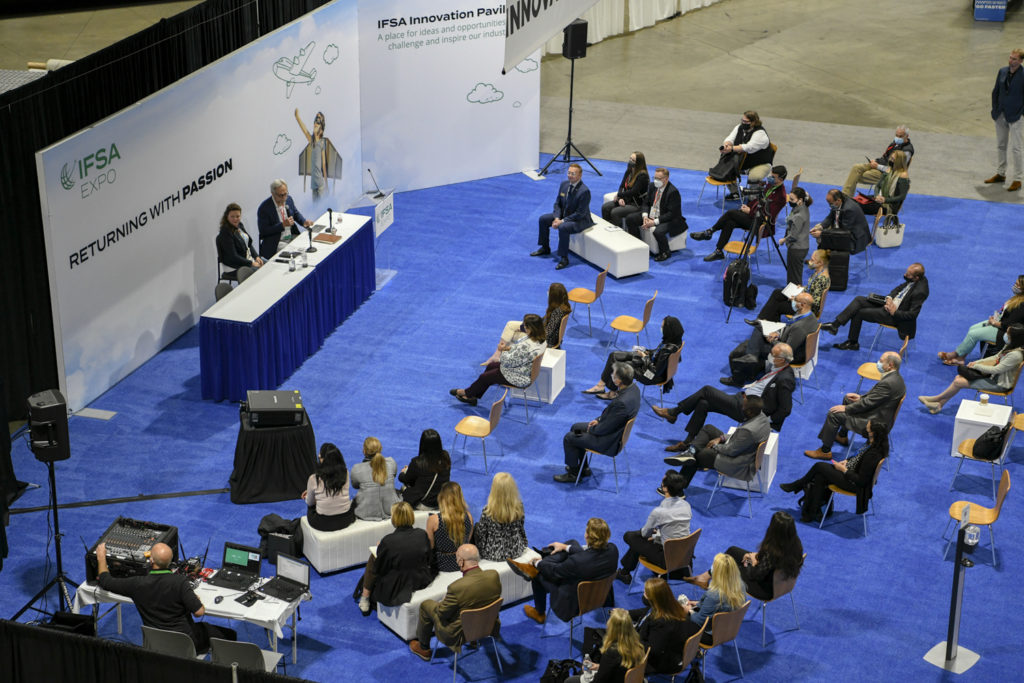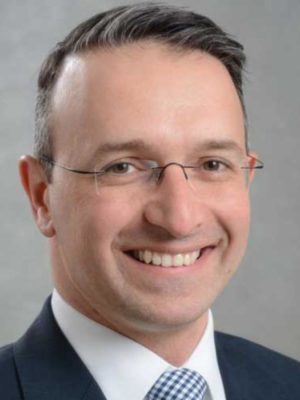Q&A: Stathis Kefallonitis Shares Top Takeaways from the IFSA Innovation Pavilion
Share

Dr. Stathis Kefallonitis, Associate Professor of Passenger Intelligence at Embry-Riddle Aeronautical University, shares his insights following a stint hosting sessions at the IFSA Innovation Pavilion during APEX/IFSA EXPO.
This year’s APEX/IFSA EXPO marked a welcome return to in-person events for the aviation industry. It was a celebration not just of what the industry can achieve in the face of adversity, but also a space to provide a hopeful vision of what the industry can become by working together. APEX Media caught up with Dr. Stathis Kefallonitis, Associate Professor of Passenger Intelligence at Embry-Riddle Aeronautical University, for some of his key takeaways from IFSA’s Innovation Pavilion, where he hosted a variety of sessions on topics including sustainability in in-flight service.
APEX: There’s been a lot of talk at this year’s show about “building back better,” but if you had to boil it down to one word, what would you say is the biggest takeaway from the IFSA EXPO?
KEFALLONITIS: Synergies. It’s not a new thing, but I think it’s more important than ever that we join forces, because we’re only experts in specific areas. I think this is the time to roll up our sleeves and make it happen, to truly innovate.
APEX: Yes, one of the panelists described it as a unique opportunity to start at the bottom again and build everything from scratch.
KEFALLONITIS: Exactly! A lot of the methods that are currently in place were designed in the 1960s, so we need to reinvent ourselves. It’s time to rethink our value proposition – maybe a passenger doesn’t need a seven-course meal in the premium cabins. Maybe an economy-class passenger doesn’t need a full meal, just a snack. But it needs to be a quality snack. Let’s pay attention to those small things and reconnect the dots there. Honestly, I think that the dots are still completely disconnected.

APEX: In what ways?
KEFALLONITIS: So if you look at the passenger journey, what the pandemic has taught us is that we’re really not good at connecting dots and creating solutions. We’re actually creating more problems. It’s time to change that, because this may not be the only pandemic and it’s certainly not going to be the only disruption. That’s why innovation and entrepreneurship are key.
APEX: Another word that we’ve heard mentioned a lot over the past couple of days is sustainability.
KEFALLONITIS: Yes. We’ve been talking about sustainability since the 1990s, so what’s changed? Nothing much. But it looks like there is a new dynamic around sustainability right now, which is exciting. I would call what we need to do “sustaining sustainability.” Things can’t just look good on paper anymore, something like using recyclable cutlery and plant-based meal boxes but not having the infrastructure to recycle them. They need to be thought through. We need processes that work.
APEX: Whether it was in terms of operations, meal offerings or entertainment solutions, a number of airlines and suppliers experimented during the pandemic. What do you think of that trend?
KEFALLONITIS: I love it! Even if it doesn’t always work, failing often to succeed sooner is important. At times like this when traffic is not back to where it once was, companies can afford to actually innovate. Some product developers and airlines have seized that opportunity, but we need more.
APEX: Talk to me about the future, where do we go from here?
KEFALLONITIS: Moving forward, I think it’s going to be about every actor coming together and creating more trust. I think that world governments could have taken a much stronger position on all this, but I’m glad our APEX/IFSA leadership voted on those four initiatives on day one of the show. We really do need strong voices from all those people, high up in governments and organizations to say that it’s safe to travel to rebuild trust. To me, that’s the biggest challenge right now. We need people, we need passengers, we need business more than ever before, but if the trust is not there it’s a challenge.
From an airline point of view, if you reach out to customers when you need them the most, you can’t just try and sell them stuff. To make them feel valued could do wonders. And it doesn’t cost a fortune to do either. It’s all about empathy – we need to be more empathetic and human. It’s like Turkish Airlines’ Group CEO & Chairman İlker Aycı said in his acceptance speech last night, it’s not about making profits for shareholders, it’s about people and we keep forgetting that.

